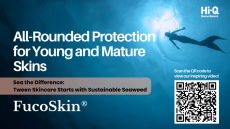Bathroom essentials startup TAKK wants to flip beauty ‘choice overload’
![TAKK offers a range of simple and genderless bathroom essentials via its online subscription service, including hand soap, shower gel, toothpaste and shaving gel [Image: TAKK]](/var/wrbm_gb_food_pharma/storage/images/_aliases/wrbm_large/publications/cosmetics/cosmeticsdesign-europe.com/article/2022/10/28/indie-beauty-brand-takk-wants-to-tackle-choice-overload-with-essentials-range-and-subscriptions/15894155-1-eng-GB/Indie-beauty-brand-Takk-wants-to-tackle-choice-overload-with-essentials-range-and-subscriptions.jpg)
Founded in 2020, the company offered a range of simple and genderless bathroom essentials, including hand soap, shower gel, toothpaste, face cream, shampoo, conditioner and shaving gel. The products could be purchased directly online via a subscription format in the UK, USA and Turkey, and also on select third-party online platforms, such as Stories Behind Things.
Speaking to CosmeticsDesign-Europe, Pinar Akiskalioglu, founder of TAKK and ex big beauty professional, said the concept was to flip mass market habits.
“The reason I founded TAKK is to challenge the ever-growing beauty industry,” Akiskalioglu said.
‘Traditionally, brands offer excessive choice’
For decades, the beauty and personal care category had continued to grow, she said, but it was questionable whether consumers needed so many new products.
“My main issue was about the choice overload. Traditionally, brands offer excessive choice. And what excessive choice does is takes the control away; it paralyses our true decision-making – the decision is not yours, but the retailer’s eventually,” she said.
Hair care was a fantastic example of how industry had exponentially grown in recent years, she said. What used to be a simple selection of shampoos and conditioners, now included hair masks, oils and pre-shampoos offering more of a seven-step hair care routine, she said.
“These are the issues we tackle at TAKK. We want to, first, change the industry narrative and communicate what really matters and offer the best of what we can find, without any marketing nonsense, and hopefully, eventually, change the way we consume personal products.”
Asked if launching yet another beauty brand was perhaps contradictory to this vision, Akiskalioglu said: “We actually want to be a shopping platform where [consumers] are not forced to buy additional products to what they intended to buy. Because there’s no shopping platform or retail in the beauty industry where you can get in and you just buy what you intended to buy. They have ‘push girls’, there are pop-up stores, email marketing targeted to you with discounts if you buy more products. That was the main motivation: to launch our own brand and own platform, to keep the promise of not selling something that [the consumers] don’t need.”
‘Subscription is a great way to reduce micro-decisions’
TAKK was committed to only selling “essential personal care products”, she said, and ensuring consumers made selected and informed decisions. The subscription model helped this, she said.
“Subscription is a great way to reduce micro-decisions in life, but also to evade the triggering pushes to buy more products than you need. It’s a way to regulate your expected consumption.”
There were also plenty of environmental benefits to operating a subscription model, she said, such as maximising resource efficiency and minimising waste. The company, for example, only manufactured what consumers needed via orders, she said.
Akiskalioglu said the company was determined to maintain this model as it evolved and grew but had compromised in some ways by offering a ‘shop’ section on its website to give consumers not keen on subscriptions the chance to try out the range before subscribing.
It also remained open to retail partnerships in the future, but with the right companies – those with a shared vision on the future of beauty, she said. “But, in terms of our communication, we believe in subscription. We believe this is the future of consumption and we will keep rooting for it and championing subscription.”
Reducing beauty’s carbon footprint
Asked what the company’s goals were for the next three to five years, the founder said: “We know what we are not interested in; we are not interested in finding the next miracle scientific ingredient for people to look better. That’s not our focus. Our only focus is to reduce ours and our customer’s carbon footprint.”
TAKK had recently assessed its business carbon footprint, she said, identifying areas where real impact could be made, though as with any beauty brand, much of the impact could be made in the consumer use-phase.
“Industry mostly focuses on the packaging, plastic packaging, because that’s very tangible and easy. But there are a lot of low-hanging fruits, like products which foam quicker or products that could be applied after showering, not in water. All our innovation focus is to make sense. We don’t look for really sexy innovations, we’re looking for practical ways to reduce carbon footprints.”
Looking ahead, the company would work on growing its business slowly, to maintain its founding principles, she said, and aim to reduce the brand’s overall impact – online and in bathrooms.

![Colgate-Palmolive has developed a translucent activated charcoal toothpaste - very different to the opaque and dark options currently on the market [Getty Images]](/var/wrbm_gb_food_pharma/storage/images/_aliases/wrbm_medium/publications/cosmetics/cosmeticsdesign-europe.com/headlines/formulation-science/colgate-palmolive-patents-active-charcoal-toothpaste-with-stannous-and-potassium-salts-for-caries-protection/16223548-1-eng-GB/Colgate-Palmolive-patents-active-charcoal-toothpaste-with-stannous-and-potassium-salts-for-caries-protection.jpg)
![Industry is going to have to turn showering on its head with new ways of washing, smart product concepts and more [Getty Images]](/var/wrbm_gb_food_pharma/storage/images/_aliases/wrbm_medium/publications/cosmetics/cosmeticsdesign-europe.com/article/2022/11/15/beauty-environment-trends-to-see-cold-showers-rise-so-industry-needs-to-innovate-says-hint-futurology-founder/15944933-11-eng-GB/Beauty-environment-trends-to-see-cold-showers-rise-so-industry-needs-to-innovate-says-Hint-Futurology-founder.jpg)

![The COVID-19 crisis has fuelled important shifts among Gen Z beauty consumers around gender, image and mental health [Getty Images]](/var/wrbm_gb_food_pharma/storage/images/_aliases/wrbm_medium/publications/cosmetics/cosmeticsdesign-europe.com/article/2022/08/25/beauty-trends-gen-z-post-covid-show-unconventional-gender-fluid-escapism-important-says-verve/15710946-1-eng-GB/Beauty-trends-Gen-Z-post-COVID-show-unconventional-gender-fluid-escapism-important-says-Verve.jpg)















